-

2021-08-24
Memes denoting the deep irony of our current moment in time seem to have become very popular since the start of the pandemic. Early on, someone used this meme to draw a comparison between the developing movement of people who claimed that COVID-19 was/is a hoax, and that refuted data by mere denial.
-
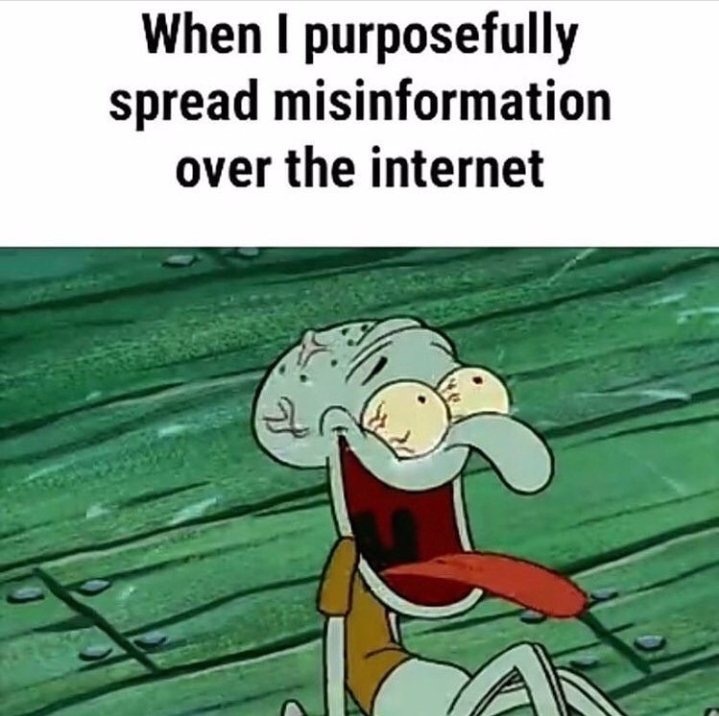
2021-02-19
Sometimes I feel as though the people grifting off of the pandemic and people willingly sharing misleading information for political reasons just do not care about the harm being caused. It is also strange because many people seem to enjoy, like Squidward here, being a bearer of “fake news”.
-

2021-06-05
This is what I imagine people doing when they turn off NPR’s latest COVID vaccines update before heading to the feed store to buy Ivermectin for COVID treatment.
-

2021-10-14
The global supply chain crisis has led to some unprecedented steps to regain efficiency. How much more recourse do the public and private sectors have?
-
2020-04-02
I live in a rural area of southeastern Louisiana. When I first moved here the only thing that you could hear at night was the natural sounds that one would think of when being in the country, but as developments started to move into my area the air was polluted with the sound of cars on the distant interstate. The nights become a harmony of grasshoppers and traffic all mixed into a melody that formed a hybrid of urban and rural life.
On the night of April 2nd, 2020 I was enjoying a night of looking at the stars through my telescope. It was a mainly clear night when I closed my eyes and began listening realized that I could no longer hear the cars on the interstate. Louisiana was in the mist of the a very high spike in COVID and lockdowns were in effect meaning there were fewer cars on the roads especially at night. I sat and listened for hours as I was able to hear all the sounds that were once masked by the intrusion of development on my rural area.
From about April 2nd until early July this quite remanded at night. It was not until Louisiana started to open up more that the sound of the cars returned to my nighttime symphony. When I look back on the early days of the pandemic this is the memory that stands out and how it will be remembered by me. Though a harsh time in the world and for humanity, the sounds of technology and modernization were drowned out by nature for a time and it made the nights a little more peaceful and less stressful with all that was going on in the world.
-
2021-10-15
Before 2020, I hardly ever burned a candle. My parents had forbid it, convinced me or my siblings were going to forget about it and burn the house down. My dorm room had extremely strict (and understandable) rules about open flames and heat sources. It wasn’t until I had graduated college and moved back into and then out of my parents’ house that I was free of these regulations. Even then, though, it never occurred to me to buy candles. My favorite scents were often nature-based and could easily be experienced by visiting the ocean, or the forest, or the occasional bakery. It wasn’t until the pandemic, when I was living in Ohio without being comfortable traveling to the ocean, or to the forest, or in public at all, that I turned to candles. Soon one impulse purchase of a sea salt and balsam scented candle turned into a constant hunt for all of my favorite scents, to bring me to places I didn’t feel safe or responsible traveling to. My collection grew rapidly, and for the past year or so I’ve had a candle lit in my home almost every day. I never thought something a simple as a $7 candle I found at TJ Maxx or Bath & Body Works could bring me so much peace, calming my need to return to my favorite far-off places until it is once again safe to do so. Don’t get me wrong, candles still can’t compare to the real smells I adore, but even a weak imitation is better than a scent-less longing. Even though I’m currently residing in Ohio, I can use candles to feel connected to my home state of California, or my favorite places to visit, bringing comfort and familiarity in a time that is anything but comfort and familiar. My bank account may not be happy with me given this new habit, but it’s a price I am willing to pay.
-
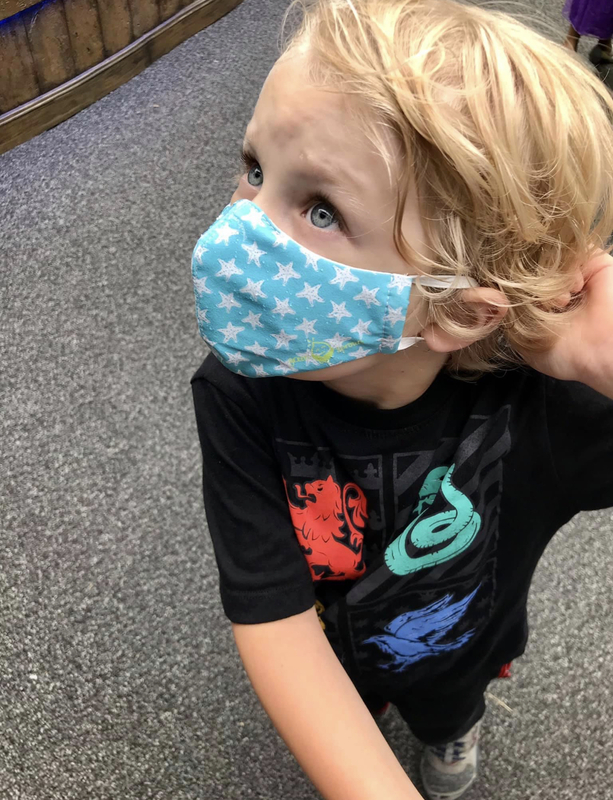
2021-10-15
My six-year-old son often forgets he’s wearing a mask. We’ll leave his school, the grocery store, anywhere really, and he’ll spend the entire car ride home with his mask still on. He’s even tried to eat with it on a few times! I can always hear when he’s forgotten to take it off because it muffles his voice. He talks constantly, I like to say that he actually voices his internal monologue, so I can tell exactly when he takes his mask off even if I can’t see him. When I hear that he’s still wearing his mask, I often think about the instability of being a child (and raising a child) during a global pandemic. His life and his routines have changed so frequently in the past year and a half, but he has been incredibly adaptive and understanding the entire time. Hearing his muffled little voice always makes me appreciate this awesome kid of mine while also making me really consider these chaotic times we’re living in.
-
2020-06-01
Hawaii is a very unique place in terms of its beauty and overall welcoming atmosphere. I grew up knowing how popular of a destination spot my state is and how in many ways we are extremely dependent on outside sources to fuel our small island economies and businesses. I had thought that aspects I had become used to seeing, such as the extremely busy downtown shopping and tourism part of Hilo, would never change. The many common things you'd have smelled seen and heard were the many cars out on the road, the overfilled wastebaskets by every park and beach, the tents of entire families at many of the beaches, and the constant rush of modern living in Hawaii. Then in March through April of 2020, the university in which I was attending at the time made the big decision to cancel in person meetings for the foreseeable future.
The days of constant business and crowded areas in a matter of weeks ceased to be. In late April continuing until recently, the most common things you would see empty streets, closed signs, empty parking lots, and most importantly of all, you would actually get to smell the salt of the water from the ocean, the chirping of birds by the dozens in commercial areas, and even the return of sea turtles to what were known to be crowded beaches. It’s as if the lack of tourism and industry during Covid-19 gave us local residents a new perspective of our home. One where it felt like we could finally breathe and stretch out our legs for a bit while we dealt with the pandemic effects.
-
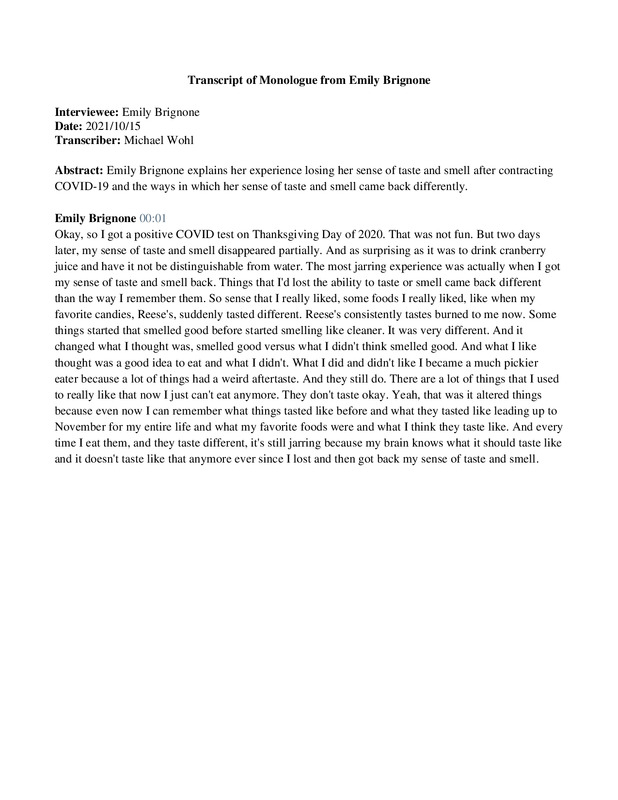
2020-11-26
The memory I related is about the difference in taste and smell before I had covid versus after. It is still altered in some ways and did not return as it was before. I still find it jarring eat something that I used to love only to find that it tastes different and I no longer like it.
-
2020-03-21
I can't think of the beginning of the COVID-19 pandemic, the shut downs and lock-ins, the stay-at-home orders without thinking of my brief foray into gardening.
My husband and I bought our house in northwest Baltimore in April 2019. Our little duplex sits near the end of an unbelievably picturesque street in a fairly affluent neighborhood known for its garden communities and HOA-hosted wine and cheese parties you have to pay to attend. The neighborhood is surrounded by much poorer neighborhoods and heavily-trafficked streets, the direct product of red-lining in Old Baltimore. While the Original Northwood neighborhood is much more diverse - demographically and economically - than it was when it was first established in the 1930s and 1940s, my husband and I, as some of the only residents under 40, still felt like we didn't necessarily fit in with our older, more well-to-do neighbors, despite absolutely adoring our little home, which had been lovingly renovated and reimagined by its previous tenants.
Come March 2020, however, the noise from the crowded streets, the surrounding neighborhoods, and from our own neighborhood, died down substantially. Our streets and its surrounds have always been a great place to go for a walk, but now every day people were strolling by in ones and twos, sometimes in small family units. Everyone needed to get out of the houses they were now cooped up in, and I was no exception.
Much to my mother's chagrin - and likely to my neighbors' embarrassment - I did not inherent my mother's green thumb. Because I am a millennial I found an app that identifies plants and set about rooting out weeds, pruning the flowers the previous tenants had not intended for me to neglect, picking up the endless stream of leaves from our several 100+ year old trees, digging up more weeds and debating with my husband about whether we should start an herb and vegetable garden or put in a patio in the little garden area that connects our front and back yards. I did not become proficient at gardening. I am much better than I was, however, at identifying the truly astonishing diversity of plants in my own garden and in my neighborhood by scent and even touch.
I learned that the dried and withered allium stalks pull effortlessly out of the ground after they die, that African violets also give way to a gentle scooping from the earth, and that thistle, of course, will still try to prick you as it attempts to cling to the soil. I learned that those thin but tough shoots of elm and oak born from the seeds and acorns the squirrels missed not only grow rapidly, but are extraordinarily difficult to rip from the earth. And no matter how much seemingly-delicate clover one claws at, its roots will always remain beneath the surface, as virulent in a day or two as when one earlier tore at it in complete dismay of its sheer stubbornness.
I did not become proficient at gardening. But I did relish the feeling of cool, damp earth underneath my hands, even in my fingernails, the crunch of dry leaves, the slick sliding of wet leaves, the red, angry weals left on my hands from those stubborn oaks. I felt accomplished as I pulled lovely, but ultimately threatening African violets and wild raspberry from underneath the spreading cover of the hostas, and as I pulled wild mint, lemon, and rosemary for tea and cooking. I told myself I'd use the ramps (a species of wild onion that smells and tastes sort of of like a combination between garlic and scallions) in a soup, as a college roommate of mine had done, but I forgot to harvest them in time. From what I recall, summertime is best, particularly late summertime.
The other thing I remember about this time spent in my garden, hands in the dirt, sweat on my brow, bug bites inflaming every available inch of skin, is the new sense of connection I felt with my neighbors who stopped to wave hello, nod and smile at my gardening efforts. Neighbors who I hadn't gotten to know before the pandemic which now prevented us, due to fear of contamination from contact with other people, from truly getting to know each other still. But somehow, the simple act of being out in my garden, doing this simple, repetitive toil, made me feel like I was participating in a ritual, an activity that linked me to the less unsavory past of the community, and to neighbors who otherwise might have remained alien in a plague environment that seemed to bring a new apocalypse with every week.
-
2021-10-15
In the year 2020, I was a medical assistant working for a cancer surgery clinic. The pandemic posed huge challenges for people working in healthcare and created new staggering standards for cleanliness and infection control. With limited personal protective equipment and cleaning supplies, it made everyday clinic operations very challenging. With cancer patients, most of whom were undergoing treatments that lowered their immune system, and many of whom had just had surgery which can increase risk of infection, medical staff took COVID safety precautions very seriously. Dealing with people battling illness can be challenging under normal circumstances because they are often feeling emotional and scared, but during COVID, tensions were running even higher. I will never forget patients using condescending, edgy, and outright angry tones with me when I would call for a COVID symptom screening prior to their appointment, inform them that they had to wear a mask at all times while in the clinic, or that they were unable to bring a family member to the exam room during a follow-up appointment with a doctor. Over the phone and in person, many patients used tense and tempestuous tones to take out their anger over a situation none of us had any control over. Often, there were political connotations to any discussion of clinic COVID policy, which was unusual in a conversation about infection control. Many patients would protest getting their temperature taken or question the accuracy of their oximetry reading (a started part of vitals even before the pandemic). It was always a relief to have a patient who took a dignified breath and calmly understood that the rules were in place for everyone's safety and were an inconvenience to all involved. There were several days where I would go off to an empty exam room during my lunch break and cry. Tension during the first year of the COVID pandemic was audible.
-
2021-10-03
My maternal grandfather passed away late last year amidst a relatively heavy pandemic lockdown, and our family has since tried to fill in for him in caretaking for my grandmother. If he could have asked something of us, I know it would have only been to look after her. He was that kind of man. He didn’t need for anything for time with his family and friends, and his utmost concern was her welfare, even when she angered him.
Recurring and cyclic apprehension and uncertainty over transmission rates, long-term vaccine efficacy and inoculated antibody generation have forestalled several attempted return trips to my hometown. Data-driven doubts have eroded my wife’s confidence that our collective vaccinations will protect her aging parents from life-altering illness and death have prevented her from traveling with me, even though she wont readily admit that outside our home. In addition to everything else the pandemic has altered or taken from us, it’s also complicated my family’s efforts to care for each other.
My grandmother turned 86 recently, and her birthday was also their anniversary. They would have been married 63 years this month, and we wanted to make sure the day didn’t pass like any other lonely Tuesday since his death. My cousins and I put together a birthday dinner at the best restaurant in town, and I traveled back to New Mexico for a week to visit and help where I could. The trip turned out to inspire a self-reflection on the power of scent in my life, emotions, and memory.
***
I drove straight to my grandmother’s home on Blodgett Street. I pushed the front door open, and an unpleasant stink hit my nostrils.
Throughout my life, that home had particular smells that transitioned over time. Everyone in my family but the children smoked cigarettes while I was growing up, and it wasn’t unusual for a blue-gray haze to hang in my grandparents’ home during family holidays. It wasn’t uncommon for their 1000 sq. ft. home to sleep ten or fifteen people when we had something to celebrate or grieve. Ashtrays often overflowed if late night poker games grew too intense to step away from the dining table. I recall one Thanksgiving from my early childhood in which heavy cigarette smoke obscured my view of the backdoor while I stood near the front door.
Even through those early years, I associated their home with the smell of sweets. Baked goods, chocolate cakes, snickerdoodles, and sugar cereals, although I’m now surprised any of us could smell anything. I never ate Fruity Pebbles anywhere but their house. Word reached my family in the mid 80s that hotboxing the house was bad for everyone’s health, and they began smoking outside. Grandad hated that; he’s the one who paid off the mortgage, so he oughta be able to smoke wherever he damned well pleased. Still, he took it outside for the grandkids.
Since they stopped smoking in the house, and especially since they quit smoking fifteen years ago, I associated their home with a particular and pleasant fragrance. I never placed it, and I’ve never smelled it anywhere else. It wasn’t solely the scented wax my grandmother leaves on warming plates for too long, which are almost always homey food scents, like apple pie. The scent of their home welcomed me back to a place I am unconditionally loved, missed, and wanted. My jokes always hit, my cooking never failed, and everyone was always glad to see me. They were also glad to take my lunch money at the poker table, which I imagine might have contributed to my perpetual welcome.
As of this trip, that unique aroma is gone, replaced by a light odor of stale animal waste. My grandmother took in a low functioning chihuahua about three years ago, and the dog is slowly and thoroughly ruining all the flooring surfaces in her home. It won’t housebreak, and it’s incapable of turning right. Seriously. The dog might be a reincarnated Nascar driver. It only turns left. When it’s excited, anxious, fearful, doesn’t matter. The only emotional arrow in its quiver is a left turn, and the only dichotomy is the circumference. The dog can run around the whole room or spin in place, but only and always left.
Lefty shit on one of my most important and reassuring emotional stimulants.
**
I also stayed with my parents, who live across town, and we share a love of food, especially comfort food best consumed with big spoons or served in casserole dishes. Because we’re New Mexicans, that means a heavy dose of Hatch green chili goes in everything produced in our kitchens. Throughout the week, my folks made all the staples for fall: red beef enchiladas, fire roasted salsa, smoked burgers, and green chili chicken stew.
While I associated backed goods and sweets with my grandparents’ home, I’ve always associated the aroma of meals with my parents, and especially the foods that take a day or two to get just right in a crock or stockpot. Bubbling green chili anything reminds me of the best parts of my childhood, and I have no unfond memories or emotions associated with it. I never caught a beating over the dinner table, never fought over a kettle of green chili. Comfort foods have historically made all the hurt and misery of the outside world go away. That’s their magic, isn’t it? No matter what the day and the world brought to your doorstep, the right foods and aromas improved everything they touched.
**
As such, the consistent and predictable wonderfulness of my parents’ home helped buttress my emotions and the loss of the Blodgett Street Scent. The disappearance of that emotional, olfactory experience altered my perception of the trip. I regarded its replacement as a bellwether of things to come, a foreshadowing of my grandmother’s seemingly imminent decline into managed in-home care. My concerns over what the light stink meant conspired with her increased hearing loss, the occasional repeated story, and the often-repeated questions to erode my confidence in her long-term stability.
Although she’s now 86, she remains independent and self-sufficient. There’s nothing she can’t accomplish on her own with enough time and naps between exertion. I think I’ve taken that for granted, though, and I should begin managing my expectations. Thanks to a left-leaning chihuahua, I have to confront my grandmother’s increasing fragility and forthcoming dependence. I regret having never attempted to define its source ingredients, although I doubt I could recreate it at any other time or place.
In the meantime, I need to get her out of the house long enough to have the flooring scrubbed and sanitized. If you’re in the market for a left-loving fecal factory, please inquire within.
-
2020-03-16
This excerpt outlines how the start of the pandemic affected the noise level of an undergraduate college campus.
-
2020-03-29
The early days of quarantine were quiet and calm, as the streets around my home in Southern California were filled with silence since there were fewer cars and people roaming outdoors. Sanitizer and rubbing alcohol were in high demand, and in heavy rotation in our home, as everything that came in was wiped, sprayed, and cleaned before being put away. I remember coming home from the store and wiping down every item with alcohol and sanitizer, and I remember wiping down every counter, surface, and phone. Afterwards, the house was filled with the sharp and dismal aroma of rubbing alcohol, as the fragrance mimicked a well-diffused scented candle. The distinctive scent wafted throughout the living room and lingered within the walls, the drapes, and the furniture. It became the scent of March 2020, and a home fragrance which lacked the expected or traditional calming or soothing properties of a candle or diffuser that is placed in a room. Every outing resulted in rubbing alcohol-infused surroundings, which served as a constant reminder of the changing climate. Eau de Sanitizer recalled the uneasiness, fear, and chaotic shops of the early pandemic, as it was a fragrant reminder of the unknown. The memory of that spring is tied to the scent of rubbing alcohol, and now every time I light a candle in my living room I am reminded of those early days.
-
2021-10-14
I live in a city bursting with lights, music, wonder, excitement, tourists, and opportunity – Las Vegas, known throughout the world for its casinos and world-class entertainment. Two of its most popular attractions are the Las Vegas Strip and the Fremont Street Experience. The Las Vegas Strip, an almost 5-mile section of Las Vegas Boulevard, is filled with an array of sparkling and neon lights showcasing casinos, hotels with thousands of rooms, restaurants, and entertainment venues -- always bustling with people. My absolute favorite sight and sound along this part of the drive is the spectacular Bellagio Fountains. As you continue on a couple of miles past The Strat, you are introduced to the sights, sounds, and smells of the Fremont Street Experience in historic downtown Las Vegas. Whether I am driving by or enjoying a night out, I love to hear the sounds of the Fremont Street Experience, where crowds of locals and tourists enjoy music along with its famous unique experiences. The Slotzilla Zipline zips laughing and screaming people above the noisy crowds looking up to see them glide under the world's largest digital display while presenting light and sound shows. It is a carnival-like atmosphere within a 6-block street party. Free bands play simultaneously on several stages along the street, while people sing and dance in the streets and have a good time. All ages find it perfect for date nights, parties, or hanging out. Then along came the dark shadow of COVID, shutting down Las Vegas, and the music stopped. The Fremont Street Experience became quiet. It was no longer a place where you could hear different kinds of music coming from multiple areas. No bands were playing your favorite dance songs or rock and roll. Fremont just became a regular street with noiseless empty hotels and restaurants. The stages were silent and bare, and the crowds' shouting, laughter, and singing disappeared. Fremont was quiet for the first time in its history. The excitement and joy were gone. It was no longer a fun place to go, and the silence felt eerie and hauntingly incongruent. Fremont, like much of Las Vegas, felt, looked, and sounded like a ghost town. Now, as we open back up to the public and the crowds return, I once again hear the laughter, the bustle of people, and live music when I drive past or show up. Fremont is back, and now there is only a memory of when the sound of silence was all that filled the air.
-

2021-10-14
This story of the pandemic deals with the sense of smell and how it relates to my experiences while working as a security guard at a local college.
-
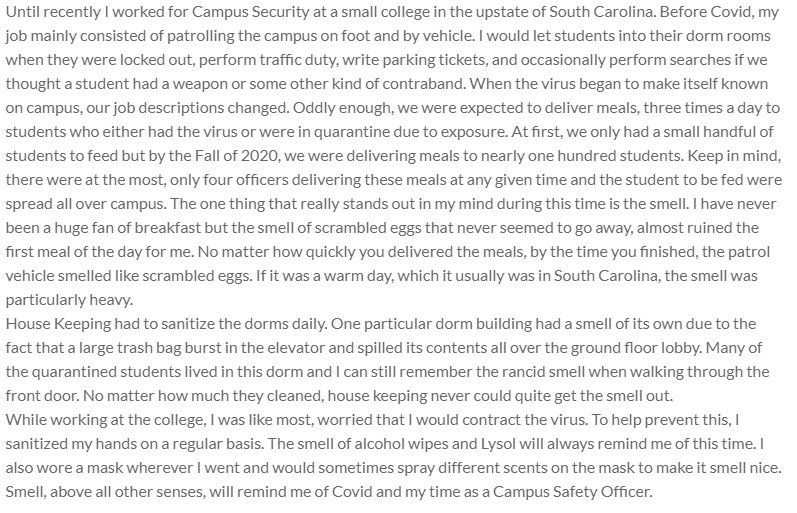
2021-10-14
Until recently I worked for Campus Security at a small college in the upstate of South Carolina. Before Covid, my job mainly consisted of patrolling the campus on foot and by vehicle. I would let students into their dorm rooms when they were locked out, perform traffic duty, write parking tickets, and occasionally perform searches if we thought a student had a weapon or some other kind of contraband. When the virus began to make itself known on campus, our job descriptions changed. Oddly enough, we were expected to deliver meals, three times a day to students who either had the virus or were in quarantine due to exposure. At first, we only had a small handful of students to feed but by the Fall of 2020, we were delivering meals to nearly one hundred students. Keep in mind, there were at the most, only four officers delivering these meals at any given time and the student to be fed were spread all over campus. The one thing that really stands out in my mind during this time is the smell. I have never been a huge fan of breakfast but the smell of scrambled eggs that never seemed to go away, almost ruined the first meal of the day for me. No matter how quickly you delivered the meals, by the time you finished, the patrol vehicle smelled like scrambled eggs. If it was a warm day, which it usually was in South Carolina, the smell was particularly heavy.
House Keeping had to sanitize the dorms daily. One particular dorm building had a smell of its own due to the fact that a large trash bag burst in the elevator and spilled its contents all over the ground floor lobby. Many of the quarantined students lived in this dorm and I can still remember the rancid smell when walking through the front door. No matter how much they cleaned, house keeping never could quite get the smell out.
While working at the college, I was like most, worried that I would contract the virus. To help prevent this, I sanitized my hands on a regular basis. The smell of alcohol wipes and Lysol will always remind me of this time. I also wore a mask wherever I went and would sometimes spray different scents on the mask to make it smell nice. Smell, above all other senses, will remind me of Covid and my time as a Campus Safety Officer.
-
2021-10-14
Here is a story of how the pandemic affected some relatives of mine who currently live in India. Specifically, they live in Bangalore, in South India. Between January and February of this year, they caught the COVID-19 disease. Perhaps they got it while they were in the central city shopping area doing routine shopping. In any case, it afflicted my relatives strongly. Two of them died, having succumbed to COVID-19. A significant way in which the disease tormented them was in their loss of sense of taste. Once COVID-19 affected them, beyond experiencing much fatigue, chills, and body aches, they could not taste anything. My affected aunt had apparently claimed, "Everything tastes like mud." The loss of taste, fatigue, chills, fever, and breathing difficulty are standard symptoms for the COVID-19 disease, which may appear 2-14 days after exposure to the virus. Also, the pandemic affects different individuals in different ways. The disease progresses in its affecting people, with mild symptoms eventually developing to severe illness. Unfortunately, until the COVID-19 symptoms passed, quarantine measures were taken against my relatives; they were confined within their apartments. As I am close to these people not physically but in a familial sense - as I am currently living in the US – their suffering had a great emotional impact on me; and their welfare means much to me. l can also empathize with Indian COVID-19 suffering, especially the notion of suffering due to lack of taste. Indian culture greatly values cuisine, and taste is an associated factor of cuisine; therefore, loss of taste is quite significant.
-
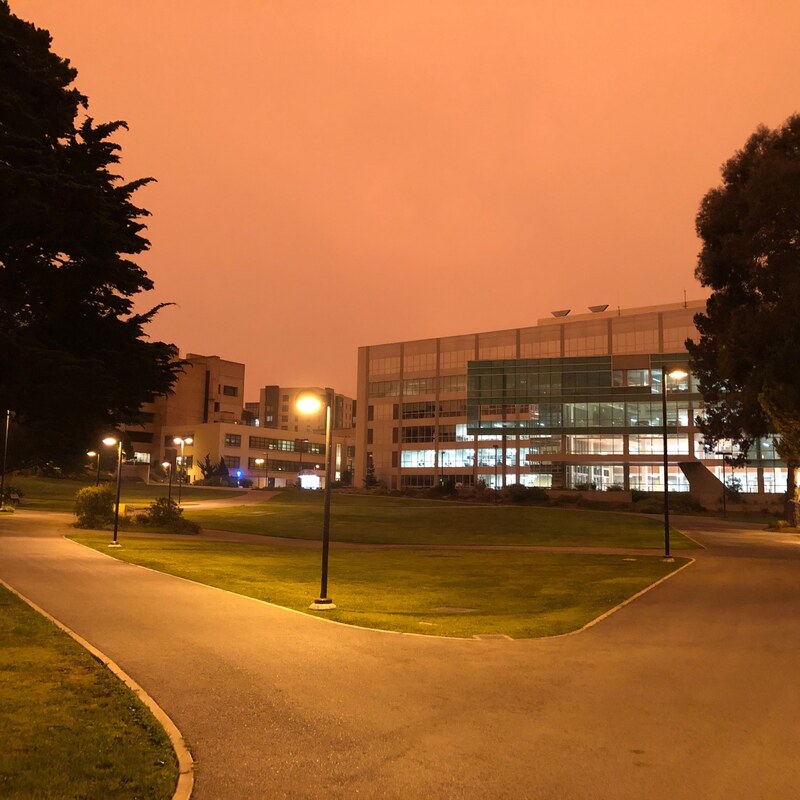
2020-09-09
The vibrant community around San Francisco State was the main factor why I decided to move into Park Merced. The ability to walk to campus each day or ride my bike with other students was exciting to see riding skateboards or bikes while smelling coffee or energy drinks was common. The smell on campus with the wide variety of food and snacks was common to every part of the campus early or late. However, this all changed once Covid was originally announced and students and staff started leaving the campus and area and the sights and sounds of people and food on the campus were silent.
The campus now remained silent and the smells of burritos and coffee were gone along with students walking to campus. The residents who used to sit outside and occasionally sat outside reading papers disappeared. The air while cleaner breathing because of the lack of air was soon polluted by the fires in California leaving a red mist that made the air smell like burnt wood.
The pandemic changed so many people's lives and it is important to recognize the impact mentally and physically people have suffered. The pandemic silenced the campus and the community silencing the site and sounds while removing the smells that the campus was known for.
-
2020-03-12
As a high school history educator, Thursday, March 12, 2020, stands out in my mind as a significant date as it was the final day of in-person instruction before our district decided to close the school until Spring Break as a result of the spread of COVID-19. There was nervous energy radiating from my students and colleagues. The fear of the unknown was palpable. I remember changing my current events lesson mid-day as the activity I had planned, monopolized by the growing health crisis, brought me too much anxiety. By that point in March, there were portable hand washing stations located at various points on campus, students more readily pumped the wall-mounted Purell hand sanitizer container on their way into my classroom, and the school sites passed out a collection of cleaning supplies to the teachers.
I used the school-provided disinfectant spray to help keep the classroom clean. The smell still serves as a visceral call back to that March day. Between each class, I dutifully sprayed the disinfectant on each desk, wiping it clean for the next student. The nose-scrunching sting of the alcohol-based cleaner filled my room rather than the calming vanilla room spray, amplifying the seriousness of the situation unfolding beyond my classroom walls. The smell lingered in my nostrils as I told my students that I would see them the following Tuesday, not knowing that those sophomores would not step foot in my classroom again before they were seniors in high school. The scent swirled around me as I packed up my belongings at the end of the day and debated how much I should bring home with me. The smell still enveloped the classroom as I unknowingly shut my door for the rest of the 2019-2020 school year and left campus. There have been many iterations of the smell of alcohol-based cleaning wipes and hand sanitizers throughout the pandemic as we anxiously try to keep ourselves healthy. The obsessive use of disinfectants reveals the desperation we feel to combat an invisible foe. However, the school-provided disinfectant still has the distinct ability to conjure memories of that emotional day in March when we were on the precipice of change.
-
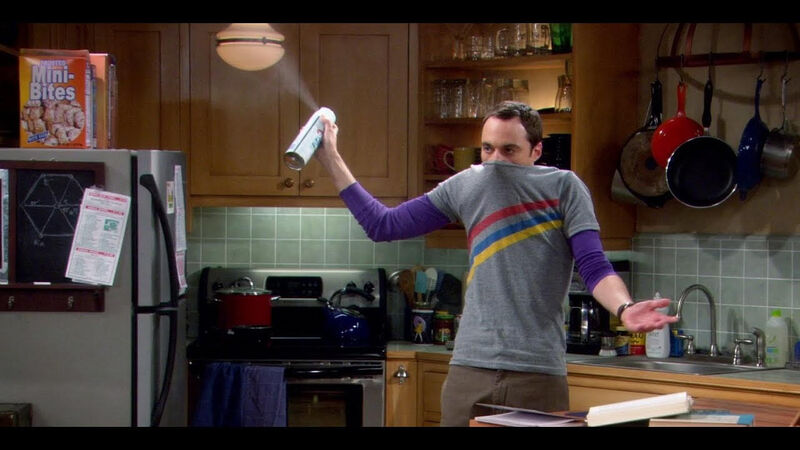
2017-03-19
You could not walk into any establishment last year without the delightful smell of disinfectant and cleaning products entering your nostrils. When I worked at Aldi and Lowes last year, the cleaning products sold out in two weeks at the start of the pandemic. The lack of these products became so bad that stores across the country had to regulate home many products consumers could buy at a time. The regulation for disinfecting the stores I worked at were in 30 minute intervals. Shopping carts, door knobs, flat surfaces, and bathrooms were all expected to be disinfected on a continuous loop. Although I agreed that these procedures were necessary, they products were used eventually caused me to develop anosmia. Today, my current job still has a huge supply of disinfectant wipes stocked up underneath the kitchen counter. This sight bewilders me because I never would have thought two years ago that having Lysol and wipes on hand would be seen as necessary now in our present future. To this day, I still cannot smell disinfectants, perfumes, and other fragrances to their entirety. I honestly see this as a blessing and curse due to past experiences with both strong aromas and odors.
-
2020-02-02
In February 2020, I moved to Vinalhaven, an island off the coast of Maine, for a job that promised to advance my career and provide time for personal introspection and growth. The island community was vibrant, and as a newcomer, I was invited to dinner parties, game nights, and book club meetings – I hardly had time to miss the family and friends I left behind in Colorado. Three weeks later, the COVID-19 pandemic required me to exchange my introduction to the community for long solitary hours. Handshakes and warm hugs from new acquaintances were replaced by cold winter days and a lack of human contact.
The seclusion drove me to explore the island’s shoreline and conservation trails and intermingle with nature that was unimpeded by humans who had retreated behind the walls of their homes. Without the distraction of a companion, I noticed the wind rushing through trees, saltwater crashing against the rocks at the ocean’s edge, bald eagles screeching, chickadees singing, and small animals scurrying through tall natural grasses near the basin. I sat so still one morning that a curious, gray mink approached me and stared for a few seconds.
One November evening, while I walked along the rocky shoreline at State Beach, an estrous scent from a whitetail doe in heat wafted from the nearby woods. While the pungent odor attracted bucks, the smell assaulted my nose and distracted me from the fresh scents of saltwater, pine, and balsam. The overpowering smell suggested that the doe was close; her presence comforted me in my isolation.
I expected to integrate into my new island home through people. Instead, I became grounded in the environment, surrounded by the sounds and scents that I may have otherwise missed.
-
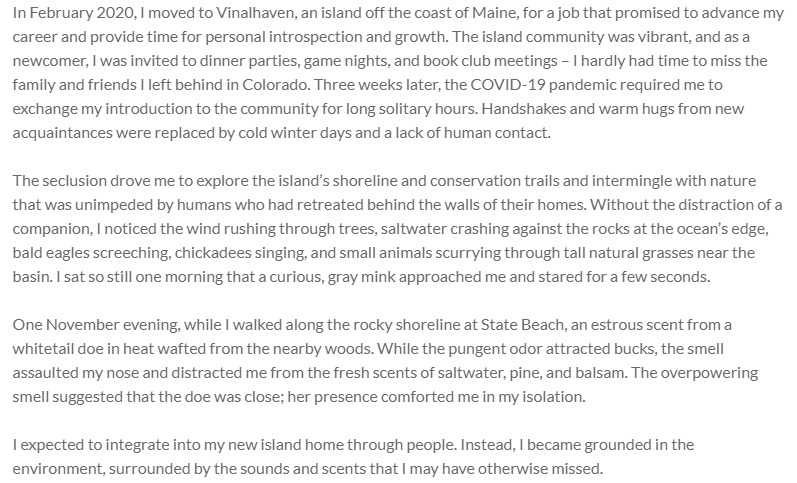
2020-02
In February 2020, I moved to Vinalhaven, an island off the coast of Maine, for a job that promised to advance my career and provide time for personal introspection and growth. The island community was vibrant, and as a newcomer, I was invited to dinner parties, game nights, and book club meetings – I hardly had time to miss the family and friends I left behind in Colorado. Three weeks later, the COVID-19 pandemic required me to exchange my introduction to the community for long solitary hours. Handshakes and warm hugs from new acquaintances were replaced by cold winter days and a lack of human contact.
The seclusion drove me to explore the island’s shoreline and conservation trails and intermingle with nature that was unimpeded by humans who had retreated behind the walls of their homes. Without the distraction of a companion, I noticed the wind rushing through trees, saltwater crashing against the rocks at the ocean’s edge, bald eagles screeching, chickadees singing, and small animals scurrying through tall natural grasses near the basin. I sat so still one morning that a curious, gray mink approached me and stared for a few seconds.
One November evening, while I walked along the rocky shoreline at State Beach, an estrous scent from a whitetail doe in heat wafted from the nearby woods. While the pungent odor attracted bucks, the smell assaulted my nose and distracted me from the fresh scents of saltwater, pine, and balsam. The overpowering smell suggested that the doe was close; her presence comforted me in my isolation.
I expected to integrate into my new island home through people. Instead, I became grounded in the environment, surrounded by the sounds and scents that I may have otherwise missed.
-
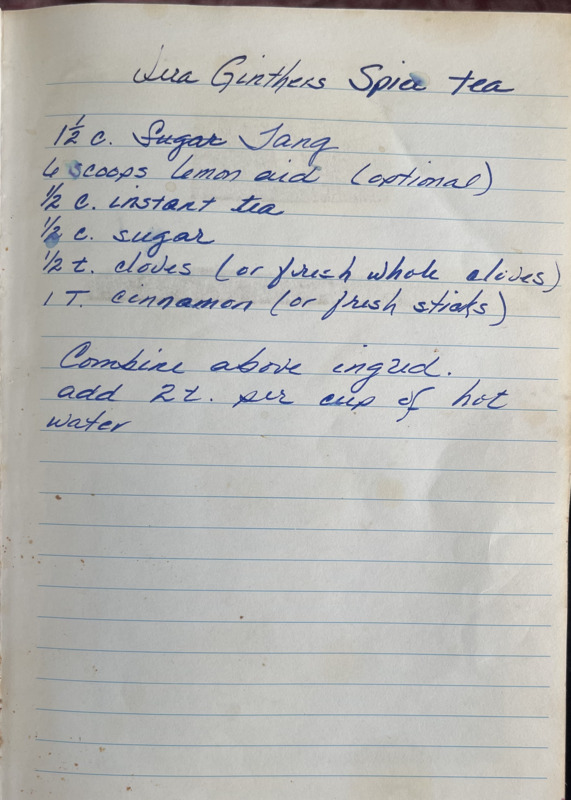
2020-04-07
Some of my earliest memories are of the sights, sounds, and tastes of my grandmother’s kitchen. She passed away almost exactly one year before the stay-at-home order was put in place in Washington State. At that time, I was already an online student working from home and my partner was driving across the state every weekend to work and come back home. When lockdown started, I didn’t realize how cooped up I would feel. I decided I needed to revisit the feelings of my grandmother’s kitchen. Around the same time, my family got a trailer full of boxes of my grandmother’s things. In this box was a handwritten cookbook filled with the recipes and stories from my childhood. There were handwritten letters from my great-grandfather to my grandmother, recipes she had clipped out of newspapers in the 1970s and 1980s, and family recipes I thought were lost when she passed. One of which was a Spiced tea, also known as friendship tea, recipe. For me, this tea is the epitome of Christmas time spent with my grandma. This recipe exists on the internet, but it was never as good as the one my grandmother made.
When I found these recipes, I set out on cooking my way through them to pass my time during lockdown. My partner was working remotely so he was home to try them with me. It was an emotional experience for me after the loss of my grandmother and it reminded me how much food can bring people together. This recipe no longer represents Christmas and my grandmother, it now is something that makes me think of lockdown with my own family and how it brought us together. If it wasn’t for the stay-at-home order, I probably wouldn’t have connected to these recipes again and I definitely would never have had to buy tang.
The pandemic has brought a greater connection to history and sensory history. The pandemic has also changed the way we experience our senses and even changed those senses for some people. Sensory history shows how people experienced the world around them during the pandemic.
If you try this recipe, don’t be afraid of adding more or less of what you like. I don’t know what measurement a scoop is, but as my grandmother always told me, we don’t measure to be perfect we measure with our hearts. My best guess is that there are about 2 tablespoons in a “scoop”.
Ginther’s Spice Tea
1 ½ cup Tang
6 scoops lemonade
½ cup instant tea
½ cup sugar
½ teaspoon cloves (or fresh whole cloves)
1 tablespoon cinnamon (or fresh sticks)
Combine the above ingredients. Add 2 Tablespoons of mix per cup of hot water.
-
2020-04-10
When schools shut down, there was a transition period where teachers waited to find out what they would need to do next. When that was decided, our work week was drastically changed. To achieve equity, we gave 30 minute lessons over Google Meets to anyone who wanted to show up twice a week. This meant a lot of free time--which meant reading!
I went to the local bookstore and there was a line: only 5 people allowed in the massive 1-block building at a time. When I was permitted entrance to the silent space, I had to accept hand sanitizer from an automatic dispenser. This was not my first encounter with the substance, but it was the most memorable. The machine whirred and spit an enormous amount into my hands, completely filling my palms with watery, reeking sanitizer. I looked around for a towel or space to shake it off...there was so much! It began sliding through my fingers and dripping down my arms, a cold, slow trickle that spread the hospital scent with it. I frantically began rubbing my hands, but even so, huge glops of it splattered on the linoleum floor as I quickly walked to spread the leaking substance more thinly over the floor and avoid creating a puddle. The sterile and unpleasant smell stuck to my skin and followed me throughout the store, into my car, and to the end of my day.
This will be hard to forget, and it made me buy my own, thicker hand sanitizer that I could control, and that smelled like pineapples and mango, and raspberry lemonade (it took some time to order, though, because so many companies were out of product). I didn't realize then, in April 2020, that machines like this would be everywhere, or that upon return to my classroom the next April, I would have my own gallon jug of it to offer students. The smell and the feel of that bookstore experience still make me cringe, yet this scent and substance have been normalized and their presence is expected and sought out. The whir and the waft of alcohol will not leave my senses, and, though they tell an important sensory history of this pandemic, I wish they would.
-

2020-04-16
A week after the first shutdown began in March of 2020, schools were shut down and I was no longer able to complete my student teaching. I was furloughed from my job and locked inside for what we originally thought would be two weeks. With no end to the lockdown in sight and nothing to do, it became stressful and quite boring. Living with my parents at the time, the entire family was locked inside and tensions were high. One day, my mom got a call from a former coworker whose dog had just had puppies a month prior. She offered us a puppy and my mom, knowing how sad I was at not having a job or an internship, accepted and I was able to pick any puppy I wanted. Freyja, my dog, was my Covid-consolation-puppy. She was very young and I was up all night and all day with her, potty training and playing with her. My time was entirely consumed by this puppy and I was never bored or alone again. We joke that she was a consolation puppy because I never got to complete the typical training any teacher before received. A few months after the first shut down ASU canceled graduation and went virtual, it was another blow, and knowing I would not be able to walk the stage to get my degree was tough to handle. However, Freyja made things easier and took my mind off things. She grew with me and she became my best friend and protector. When I moved out, she kept me safe. When I separated from a long-term partner, she was what I found joy in. I love my dog very much because she came into my life when I needed her most.
-
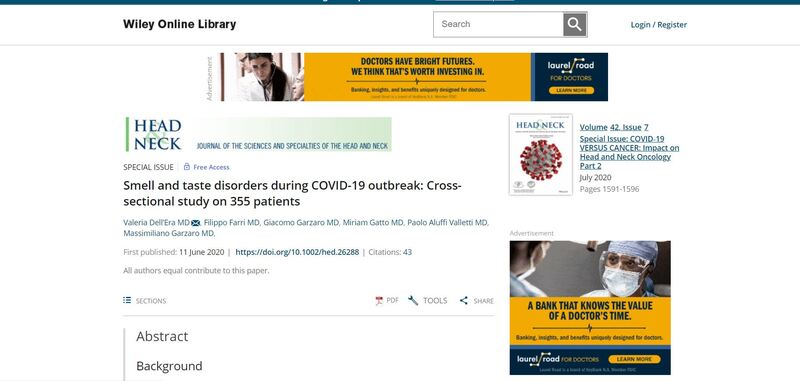
2020-05-12
2. Description: Among the most commonly observed effects of Covid-19 on patients are deteriorations (temporary or permanent) of taste and smell (Dell’Era et al. 2020, p. 1591). During the Italian Covid-19 outbreak in 2020, Novara University Hospital conducted a cross-sectional study examining the extent of smell-and-taste related disorders among patients confirmed to have contracted the virus. Results from the study suggest that an overwhelming share of patients experience sharp alterations in both senses, the severity of which differs from subject to subject. While extreme symptoms disappeared a fortnight after subjects participated in the study, a portion of respondents reported lingering sensory effects resulting from the virus (Dell’Era et al. 2020, pp. 1591-96).
-
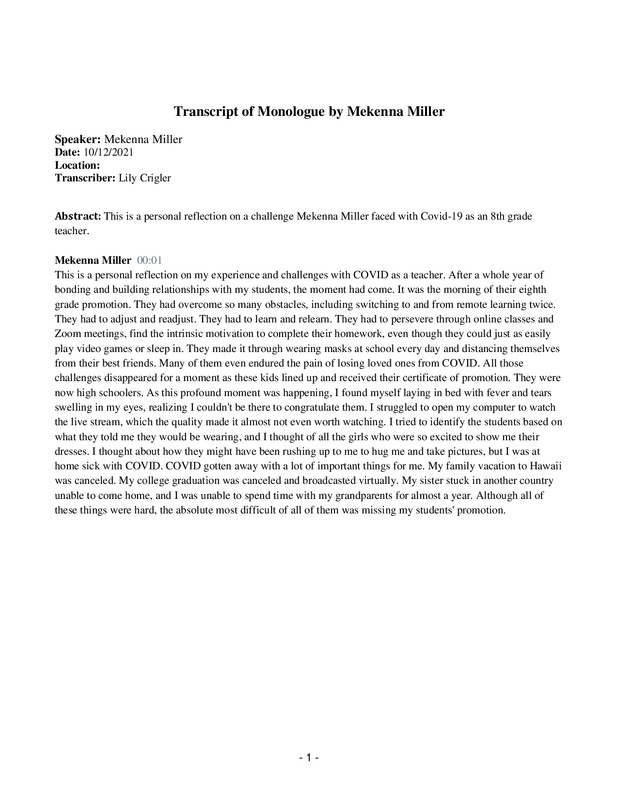
2021-10-12
This is a personal reflection on a challenge I faced with Covid-19 as an 8th grade teacher. Unfortunately, because I got Covid-19, I had to miss my students' promotion--a moment I had been looking forward to all year. I was so proud of my students, and I only wish I could have been there to congratulate them and wish them a final goodbye.
-
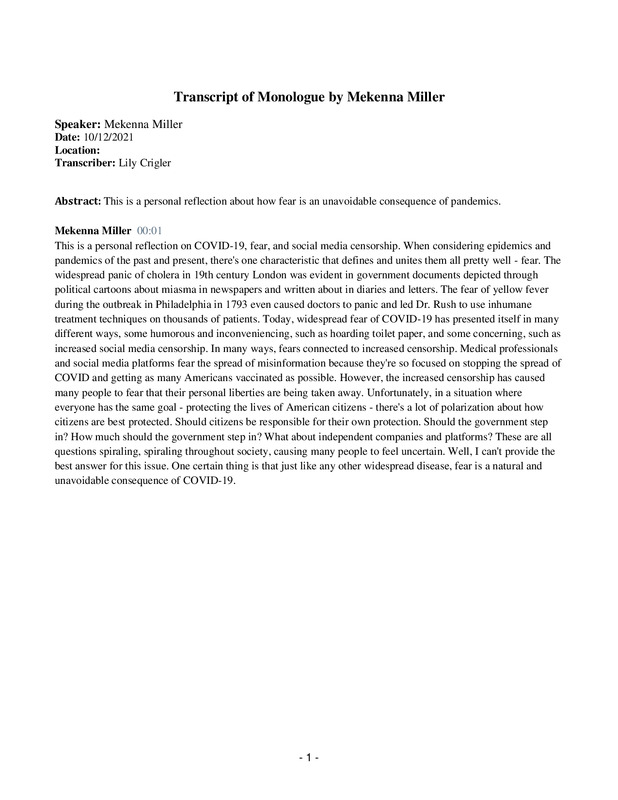
2021-10-12
This is a personal reflection about how fear is an unavoidable consequence of pandemics.
-
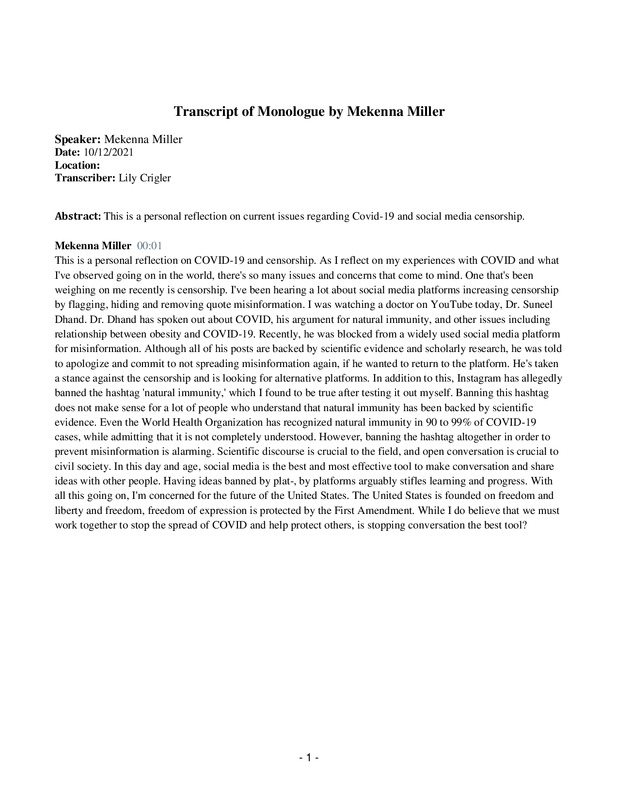
2021-10-12
This is a personal reflection on current issues regarding Covid-19 and social media censorship.
-
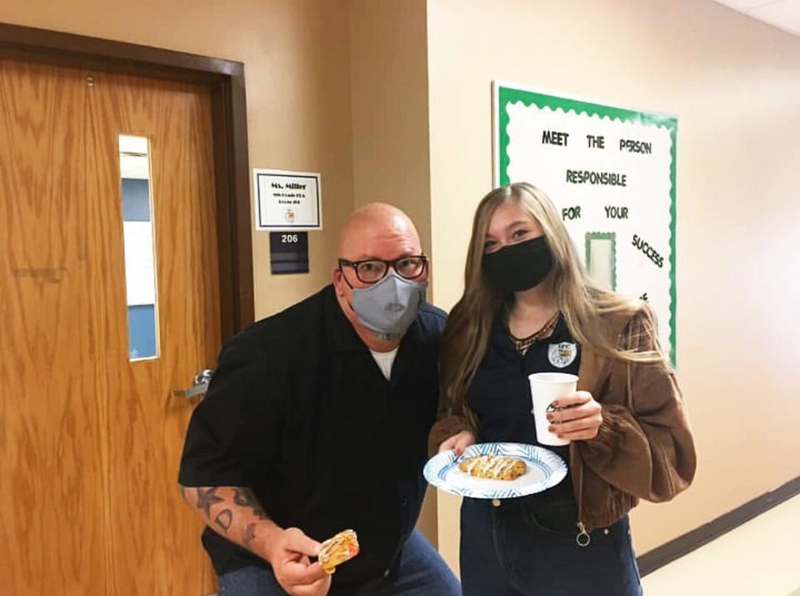
2020-10-02
Back to school is always a scary day for kids, but it can be for teachers too--especially after getting used to remote learning for so long. 2020 was my first year as a teacher. I started teaching online, and we eventually transitioned back into the classroom. For me, it was my first time in the classroom. I was super nervous about teaching and about all of the risks involved with school reopening. Thankfully, my school administration helped make everyone feel comfortable, and we had a lot of fun celebrating the start of school! This is a picture with a coworker of mine, my "classroom neighbor."
-
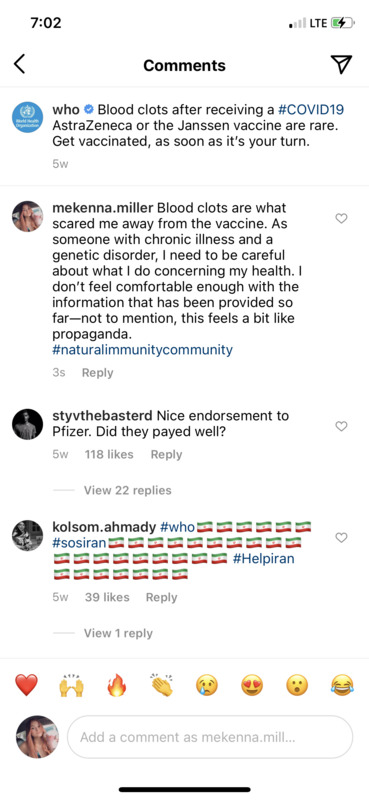
2021-09-07
As someone who has studied the history of disease and epidemics, I know that disease causes widespread fear and panic. The uncertainties and unknowns of disease cause people to question themselves, others, and even medical professionals. Sometimes, questioning and being skeptical is what saves lives. For example, questioning Dr. Rush's treatment methods in the yellow fever epidemic of Philadelphia or questioning miasma theory during the outbreaks of cholera in London. Recently, there have been cases of blood clots as a result of the Covid-19 vaccine. This is a screenshot of what WHO has to say about the blood clots and a comment from myself. While I would love to get the vaccine, and I was originally hopeful about getting it, I'm too scared and unsure what to do. Although WHO says cases of blood clots are rare, there are still many people like myself who are skeptical and only want to make the right decision for their own health and life. With talk of possible mandated vaccines, I am uncertain about what the future will look like for me and others like me.
-
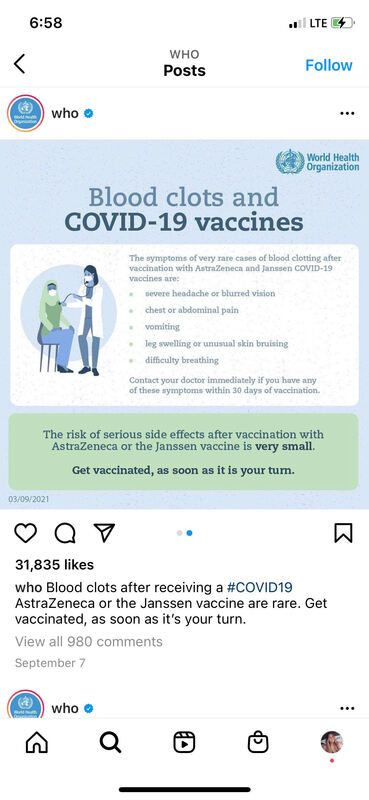
2021-09-07
As someone who has studied the history of disease and epidemics, I know that disease causes widespread fear and panic. The uncertainties and unknowns of disease cause people to question themselves, others, and even medical professionals. Sometimes, questioning and being skeptical is what saved lives. For example, questioning Dr. Rush's treatment methods in the yellow fever epidemic of Philadelphia or questioning miasma theory during the outbreaks of cholera in London. Recently, there have been cases of blood clots as a result of the Covid-19 vaccine. This is a screenshot of what WHO has to say about the blood clots and a comment from myself. While I would love to get the vaccine, and I was originally hopeful about getting it, I'm not too scared and unsure what to do. Although WHO says cases of blood clots are rare, there are still many people like myself who are skeptical and only want to make the right decision for their own health and life. With talk of possible mandated vaccines, I am uncertain about what the future will look like for me and others like me.
-
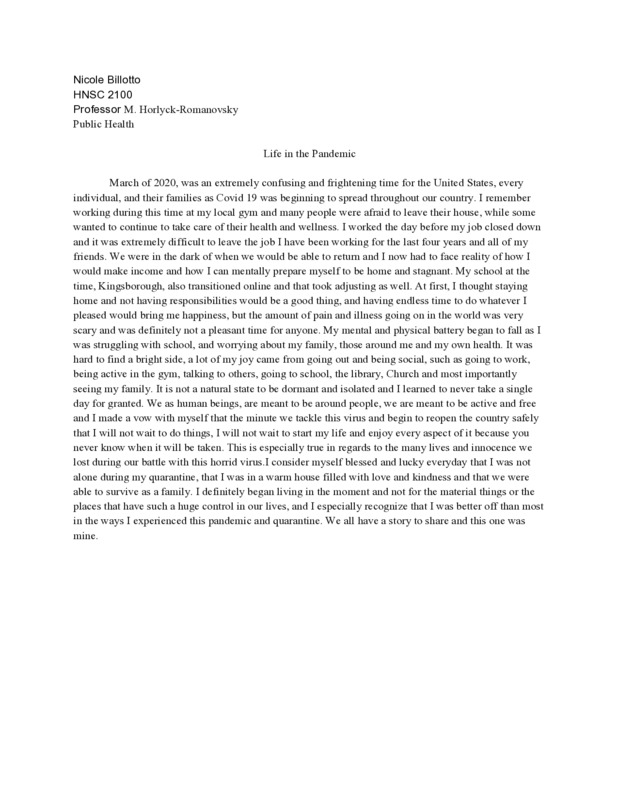
2020-03-12
I am submitting a small glimpse of what life was life for me during Covid 19 and quarantine
-
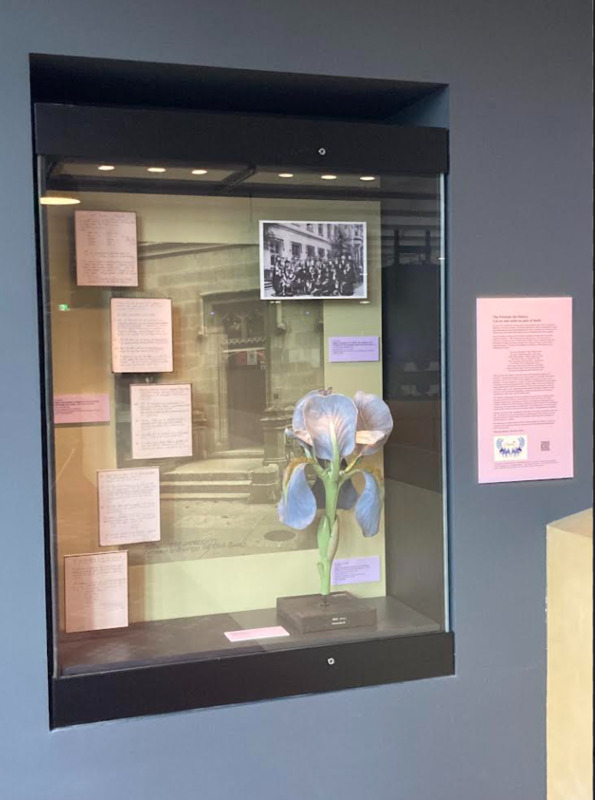
2021-07-29
After a year as subeditor, I was lucky enough to be appointed the 2021 editor of Chariot, the undergraduate history journal at the University of Melbourne. As an initiative to raise student engagement and make history more interesting, I worked with the university staff and one of our previous contributors of the journal in turning her essay into an exhibition in the university's Arts West building. Unfortunately, due to the lockdown, I was unable to see the exhibition in person myself, but the experience of putting it together from start to finish was a hugely rewarding one.
-
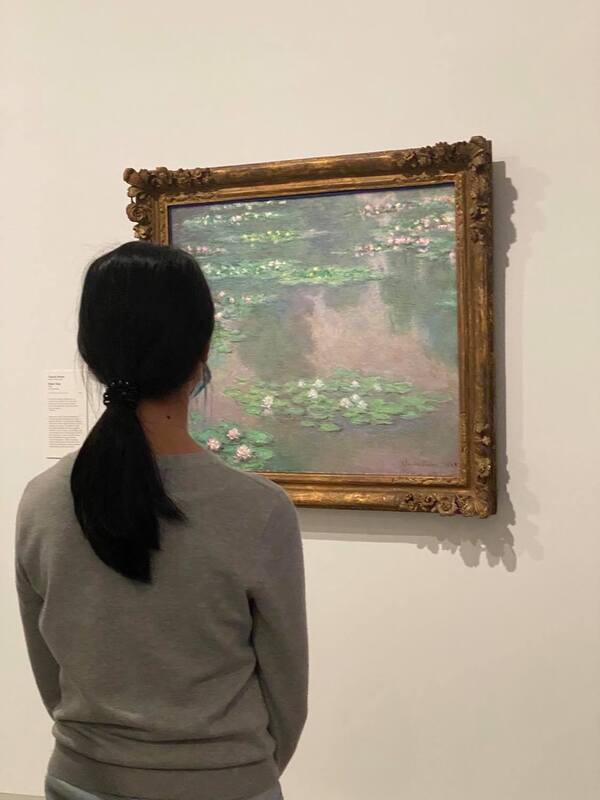
2021-06-30
Before Melbourne went back to its fifth round of lockdowns, a friend and I bought tickets for an exhibition on French Impressionism at the National Gallery of Victoria. It was an absolutely amazing feeling, not only just being out of the house but also being able to see these famous paintings which I've only seen images of online previously up close. While nowhere near an expert on art or art history myself, my experience in working in a museum and putting together a small exhibition earlier in the year made me appreciate the carefully curated exhibition.
-
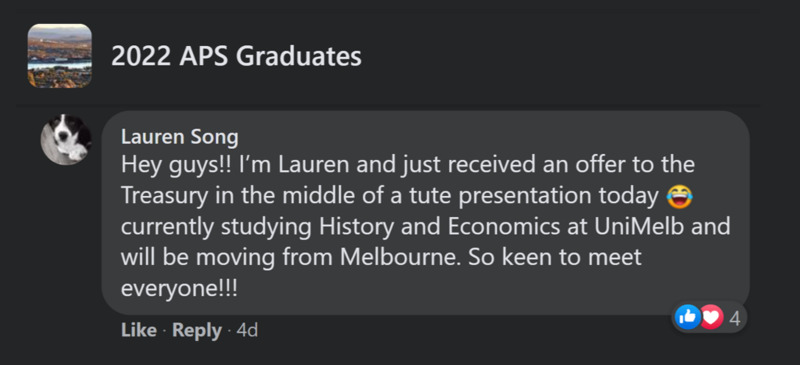
2021-08-23
Due to the pandemic, I had to scrap my original plans of travelling after finishing my degree and to apply for jobs instead. I have always dreamed of working in economic policy, so I applied to the graduate economist program at the Australian Treasury in Canberra, my dream job. Going through the entire recruitment process remotely was a peculiar experience, and was, in some ways, even more daunting than doing in person interviews. When I finally received an offer, I felt that I was dreaming. In some ways, the lockdown was a blessing in disguise for me, as I would not have applied for the role if it was not for the pandemic disrupting my original plans.
-
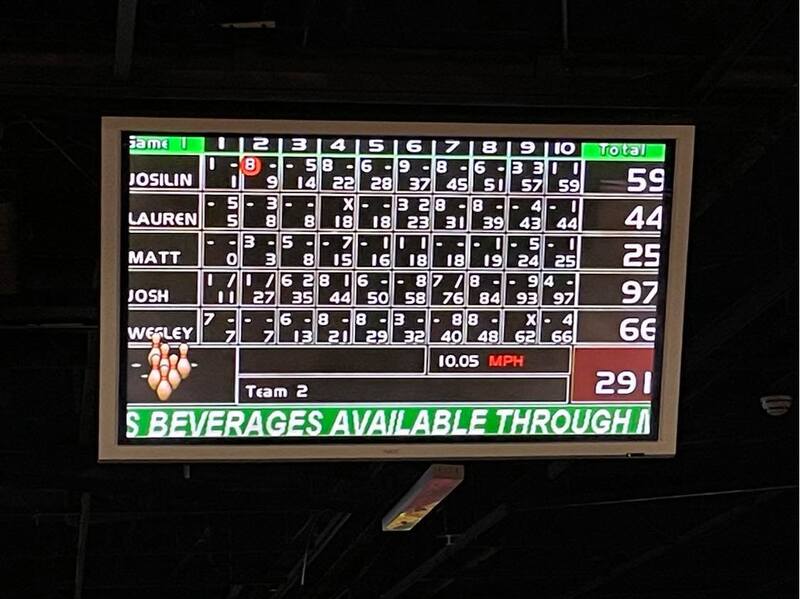
2021-06-23
Despite the lockdowns, there were a few brief periods throughout the year where Victorians were able to safely venture beyond a five kilometre radius of our homes. On the day I finished my semester one exams, I met up with a group of friends and together went bowling at Melbourne Central. While I received a rather embarrassingly low score, we all hugely enjoyed the feeling of being able to meet up and have fun in person to celebrate the end of exams. None of us would expect another round of lockdowns only a few weeks later, and looking back, I certainly wish I was able to cherish that night more.
-
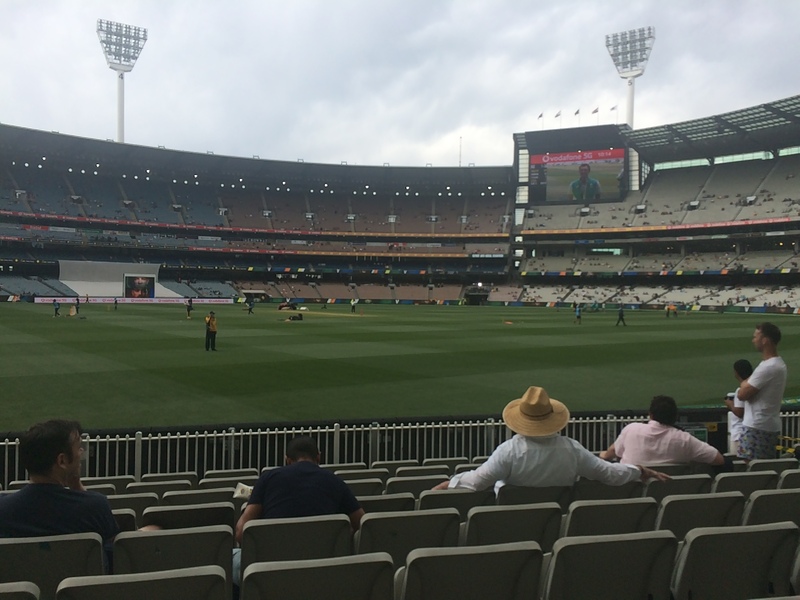
2020-12-27
Despite most activities being cancelled due to restrictions, I was lucky enough to score four free tickets to the Boxing Day Test cricket match in Melbourne at the MCG, and I brought three of my friends to the match. It was actually my first time at a live sporting event, so it was particularly memorable for me. Rather scarily, we soon found out a few days later that one of the spectators on that day would later test positive for COVID-19, leading me to take a COVID test myself, which thankfully turned out to be negative.
-
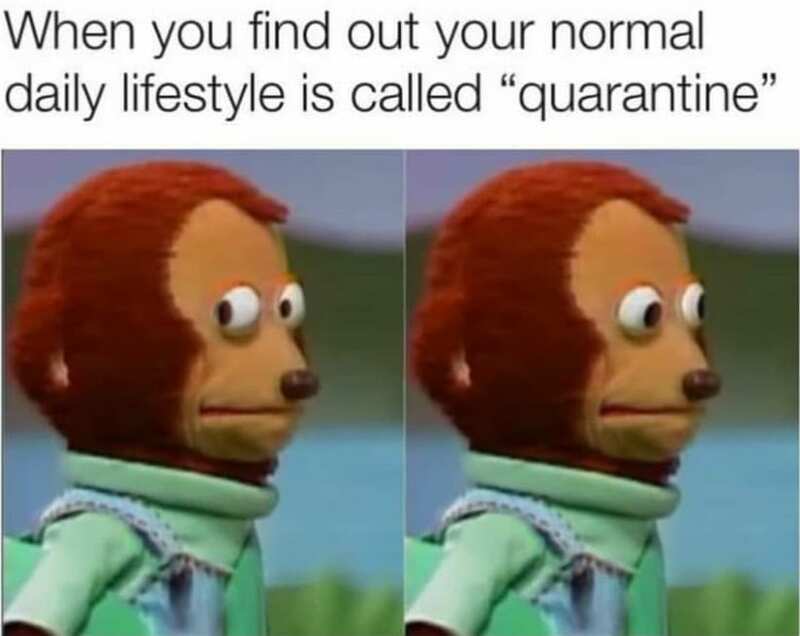
2020-03-26
As an introvert, I never felt affected by a lot of the changes that took place when Covid struck. I stay at home most of the time if I am not at work, and I don't often go out in large social gatherings. I love my personal space, and I prefer the anonymity of wearing a mask. Sometimes, Covid felt like an excuse to stay home and do the things I love. This is not to underestimate the challenges that everyone faced; I just faced the challenges through my health and job, not social distancing or quarantining. These memes reflect a lighthearted view of what it was like to experience Covid as an introvert.
-
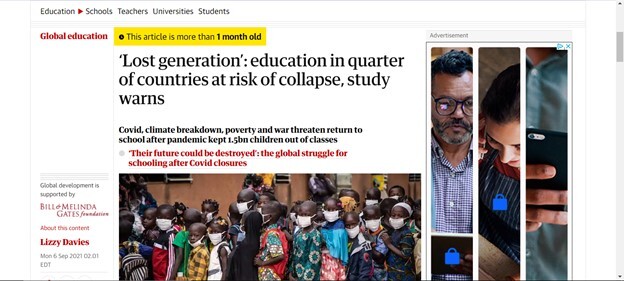
2021-09-06
When COVID hit and schools were forced to shut down, education had to transform in many ways. Students began remote learning through video conferences and online tools like Google Classroom. Moving online not only took away a lot of the personal interaction and connection between students, but it made learning the content even more difficult. Students were less motivated, it was more difficult for them to ask questions and get their questions answered, and many students began to fall behind. Transitioning back into the classrooms has helped students begin to pick back up from where they left off with their class content, but there are still so many absences daily in classrooms all across the country. This article discusses the issue of how future generations will be impacted by the COVID education crisis.
-
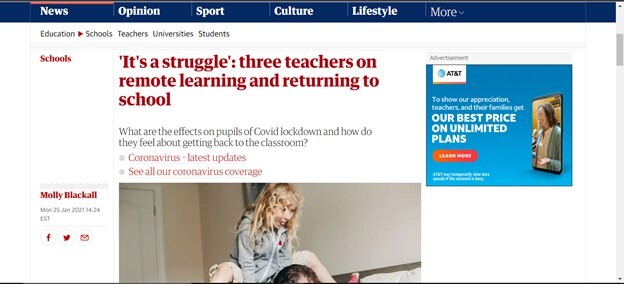
2021-01-25
Teachers all over the world had their entire profession change when Covid-19 struck. They had to take on more roles and wear new hats. This article shares the story of three teachers and their experience with remote learning and thoughts on returning to school.
-
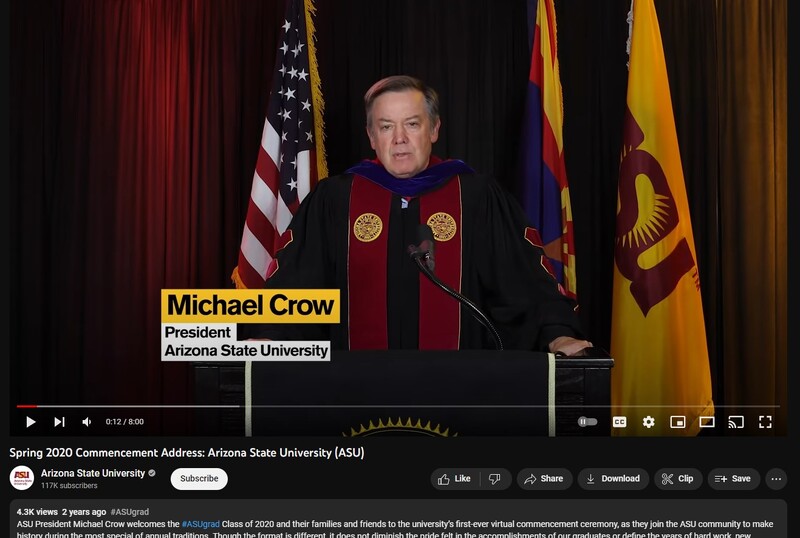
2020-05-11
The day I had worked so hard for had finally come, and I sat on my couch to celebrate. Years of dedication, essays, long lectures, early morning lectures, scholarship hunting, and finals stress had all amounted to me celebrating my graduation in my pajamas. It didn't feel real. I cried for a while, and I think it was okay to cry. COVID-19 took away special things from everyone. It has taken away special loved ones, special plans, and special events/celebrations. For me and so many other college students, it took away a very special moment--the pride, sense of accomplishment, the payoff. Colleges around the country tried to imitate graduation the best they could with virtual ceremonies. Some ceremonies featured pictures and quotes from students, and most colleges provided an online commencement. I was too sad and frustrated to watch my commencement on the day of my graduation but watching it back has made me realize how much more my degree means to me.
-
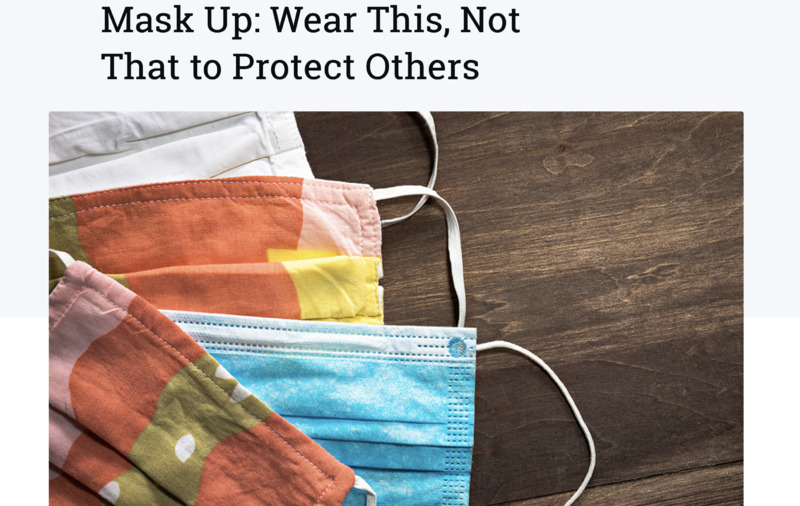
2020-07-01
A blog post from Banner Health about risks associated with gathering.
-
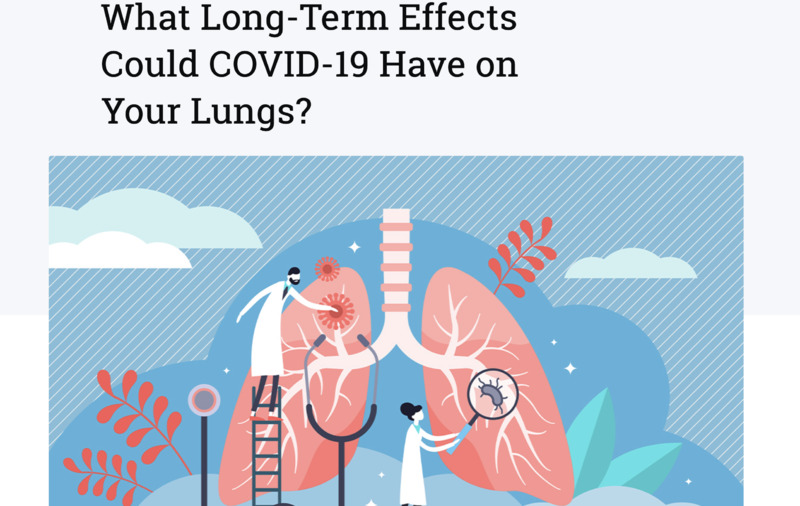
2020-06-22
A blog post from Banner Health about the long-term effects Covid-19 can have on the lungs.
-
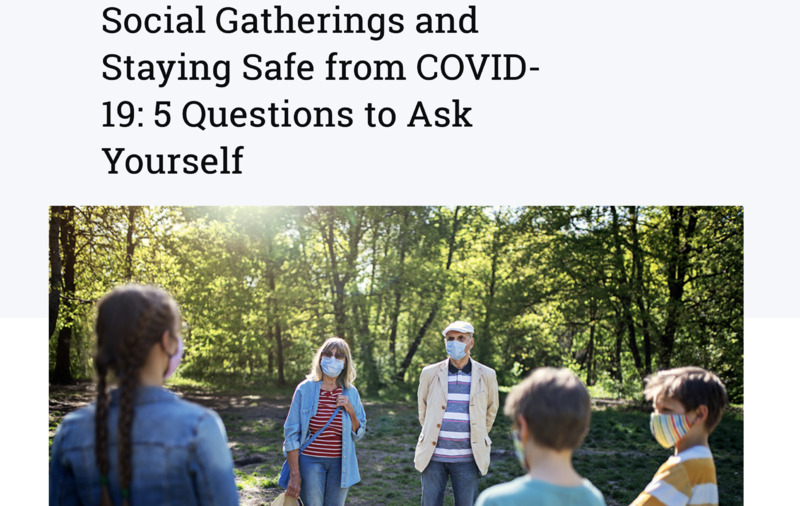
2020-06-08
A blog post from Banner Health about risks associated with gathering.
-

2020-06-05
A blog post form Banner Health about safety risks.
-
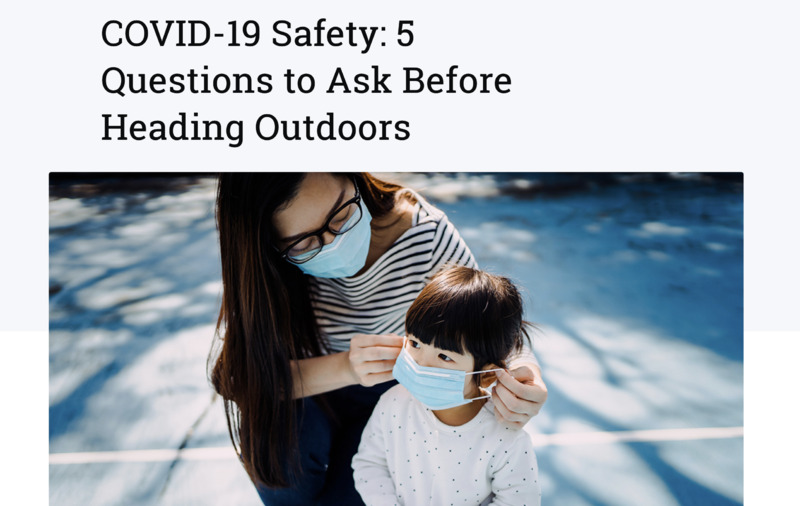
2020-06-04
A blog post from Banner Health discussing guidelines about outside activities.
-
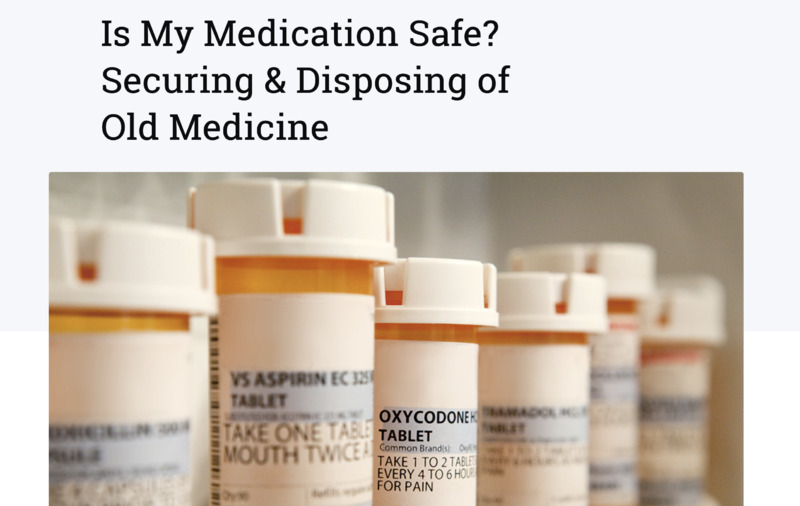
2020-05-27
A blog post from Banner Health on how to safely dispose of and store medications.
-
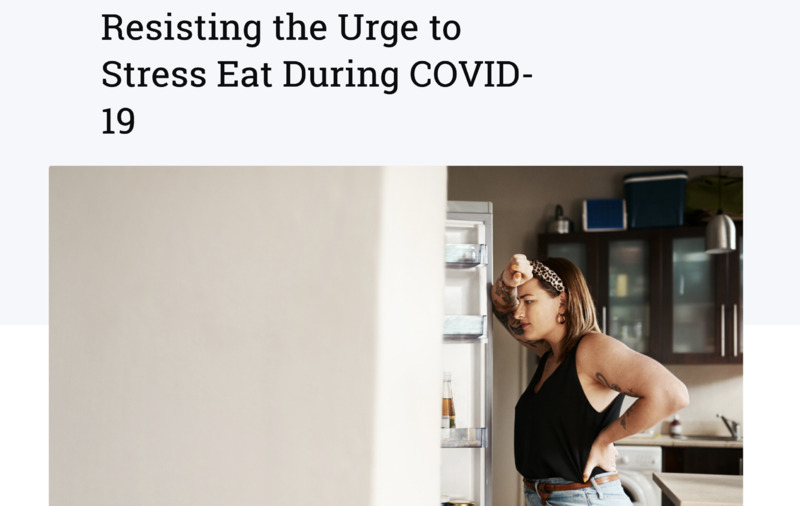
2020-05-26
A blog post from Banner Health on managing the urge to emotionally eat.
 2021-08-24
2021-08-24 2021-02-19
2021-02-19 2021-06-05
2021-06-05 2021-10-14
2021-10-14 2021-10-15
2021-10-15 2020-11-26
2020-11-26 2021-10-14
2021-10-14 2021-10-14
2021-10-14 2020-09-09
2020-09-09 2017-03-19
2017-03-19 2020-02
2020-02 2020-04-07
2020-04-07 2020-04-16
2020-04-16 2020-05-12
2020-05-12 2021-10-12
2021-10-12 2021-10-12
2021-10-12 2021-10-12
2021-10-12 2020-10-02
2020-10-02 2021-09-07
2021-09-07 2021-09-07
2021-09-07 2020-03-12
2020-03-12 2021-07-29
2021-07-29 2021-06-30
2021-06-30 2021-08-23
2021-08-23 2021-06-23
2021-06-23 2020-12-27
2020-12-27 2020-03-26
2020-03-26 2021-09-06
2021-09-06 2021-01-25
2021-01-25 2020-05-11
2020-05-11 2020-07-01
2020-07-01 2020-06-22
2020-06-22 2020-06-08
2020-06-08 2020-06-05
2020-06-05 2020-06-04
2020-06-04 2020-05-27
2020-05-27 2020-05-26
2020-05-26